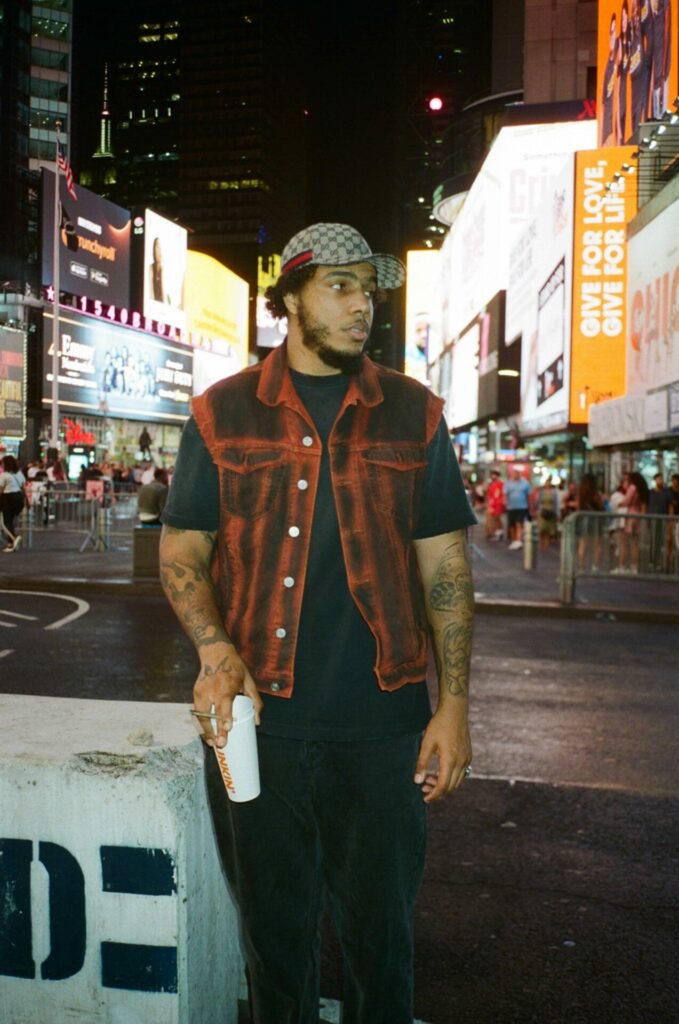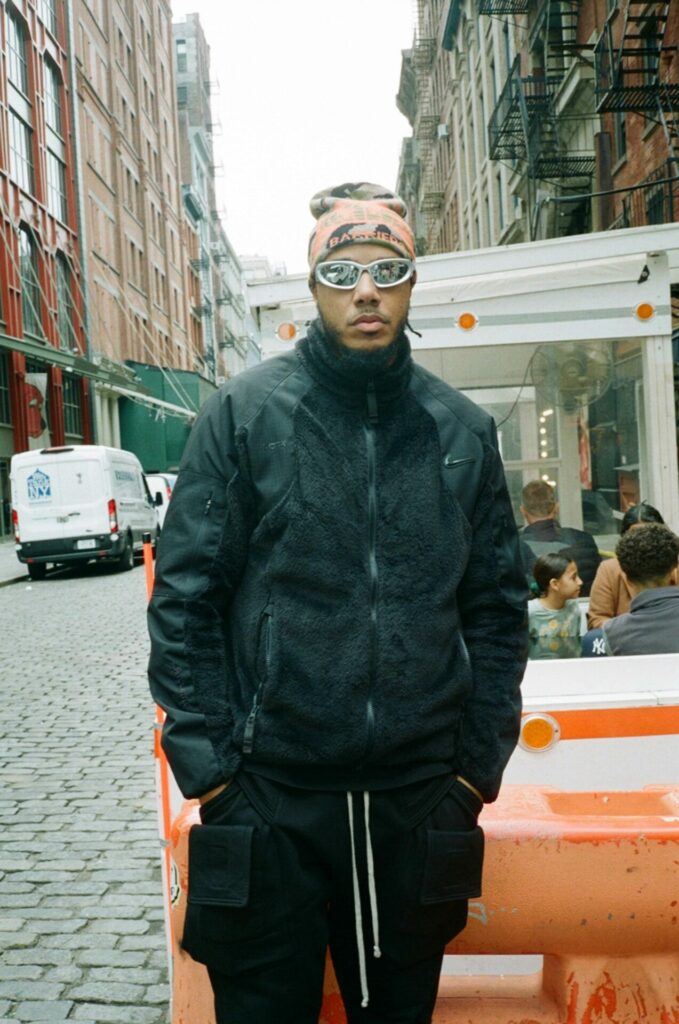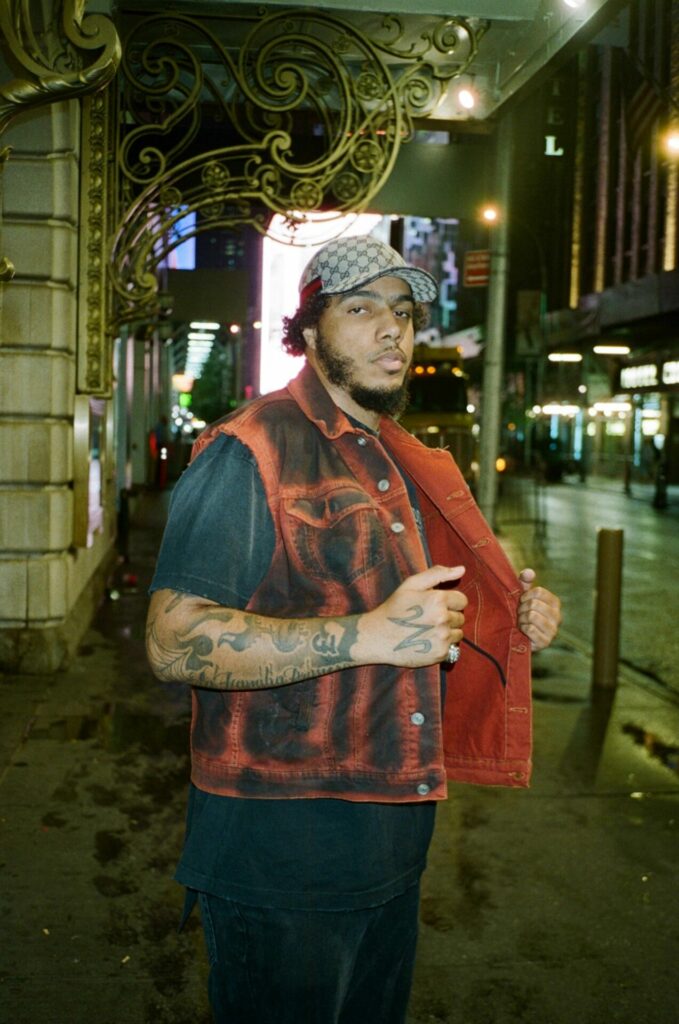AJ Tracey: learning how to be vulnerable
One of the biggest names in Black British music talks his forthcoming album, his admiration for Japanese culture, and solidifying his legacy.
By Elle Evans

It’s been three years since AJ Tracey and I last spoke, and in that time there has been a lot of growth. Sitting comfortably in his home with his family at his side, Tracey’s warm nature puts me at ease as we catch up on the time that has gone by. Following what’s been a chaotic press run as he gears up for the release of his third studio album, Tracey playfully promises that he’s no longer going ghost — a familiar joke between him and his fans. After a three-year wait, he’s finally found the studio. “I promise I’m not going anywhere! I swear down. Everyone just thinks I am going to go missing again,” he jokes.
To his 1.1 million Instagram followers, Tracey sustains a sense of familiarity with his photo content — or IG dumps if we’re really playing it cool — and by using his voice for the greater good. He retains an essence of relatability that five platinum singles and billions of streams can’t surpass. Despite all his success, Tracey is still firmly rooted within his community and representing minority groups. After growing up in a single-parent household with two younger siblings, he made it his mission to defy the odds and to create an unimaginable life for his family.
From uploading ‘Swerve N’ Skid’ to SoundCloud in 2011, which earned him one million plays, he took it upon himself to gain commercial support. Submerging himself into the depths of X (then Twitter), he scoured the web for email addresses of people in the music industry and fired off messages in the hope that someone would respond. His efforts resulted in success. Since switching out pirate radio for the Glastonbury stage, the child of grime has become a blueprint for independent artists. Showing huge strength of character, his example is a testament to continuously striving for more.

Ostensibly, we are here to discuss the long-awaited next album. However, it wouldn’t be a chat with the hit-maker if we didn’t discuss his admiration for Japanese culture and anime. If your ear is placed firmly to the ground, you’d know that Tracey often weaves anime references (‘Wifey Riddim 4’ — “Set good and she love her anime like me / Jujutsu Kaisen, Baki Hanma analysin’ / Cute in a plain white tee”) — throughout his music.
In his work, Tracey has always placed tremendous emphasis on speaking with conviction and precision. He pays scrupulous attention to detail — you only need to watch the ‘Wifey Riddim 4’ music video to gauge this. That’s why it doesn’t come as a surprise when he mentions that he’s been researching the history of Japan. He often draws from Japanese culture for creative inspiration, with more references set to land on the forthcoming album. Tracey’s fascination with Japan extends beyond listening to J-pop or following in the footsteps of Skepta and Pierre Bourne by sampling 90s Japanese music in the studio — it’s their wider culture he admires too.
“It all started out as me watching Dragon Ball Z as a form of escapism,” explains Tracey. “I genuinely took the time to learn about Japanese culture because I wanted to explore Japan. In fact, a lot of the art in my house is Japanese. It’s worlds apart from where we’re from. I thought it was my due diligence to learn the history of Japan and what’s going on over there. It’s not good to just romanticise things, us in the west love to do that.”
At a time when genre conformities are drifting as artists become more daring when exploring their sound, Tracey’s catalogue represents the sounds of Britain. Sure, featuring with American household names including T-Pain, NAV, and Kehlani, or the use of Jersey-style beats demonstrate his versatility, but it’s tracks like ‘Ladbroke Grove’ that speak of his British essence and sense of community. In the summer of 2019, his break-out hit found its epicentre in UK cities, bringing the nation together. You could have stepped into any event, party or barbecue and that tune would be blaring through the speakers.
“The main driving force behind this album [is that] I speak from a place of privilege. I know I am [privileged], but it’s less about monetary gain and more about making sure that my legacy is 100 per cent stamped in the UK,” he says, reiterating the importance of that message coming through on his next album.

Journeying back to 2019 and the release of his self-titled debut album, which for most artists stands as a pillar or a foundation to build upon, he received an abundance of accolades online, solidifying his bubbling status. Tracey took his message a step further with sophomore album Flu Game two years later. Leading with a conceptual project, he homed in on his love for basketball, in particular a famous Michael Jordan game that has gone down in history. During the 1997 NBA Finals, Jordan fell ill, but the world-famous basketball player battled on and continued with the game, which swiftly picked up the famous title, ‘The Flu Game’. Heavily influenced by hip-hop and US culture from a young age, Tracey was inspired to create a pivotal album.
Those first two albums represented a defiant chapter in his life, before the pandemic struck and put his timeline on hold. What was meant to come sooner didn’t. “I planned to drop this album, but real life started real life-ing,” he says of the extended gap between his second and third albums. “I’m gonna blame Covid. I know it’s a cheap shot, but it knocked everything back! I had a tour for Flu Game, but it didn’t end up going through. As an independent artist, I make most of my money through touring. Don’t get me wrong, streaming is great, but touring is where it’s at.”
Taking it back to his roots, AJ refers to his upcoming album as capturing the essence of British culture. Striving to keep the album title and release date a surprise for his fans, Tracey has already dropped Jorja Smith as a feature, among others. His mission was to strip it all back. “Sonically, there’s grime, garage, UK house, and funky house on there,” he says of the breadth of genres the new record touches. “My last two albums had American features on because I have genuine relationships over there, but this time, I wanted to put them all on hold. I wanted to go straight British. If you went to an underground rave, there are songs you can play there, a boujee UK nightclub or even vibing on a summer’s day in Hyde Park, the music is still applicable.”
Staying in his west London studio for the creation of several tracks, a large portion of the album was made at Angelic Studios near Oxford, on a farm tucked away in the hills of the British countryside. Swapping the big city lights for fresh air and nature, Tracey and his team headed there for a spot of serenity and clarity. “It’s really pretty out there, fresh country air and there’s little hedgehogs, rabbits and that…” he laughs. I jokingly suggest that I can’t imagine him on a farm. “Nah, I had my wellies on and everything,” he jokes.

As fun as it is picturing AJ Tracey on a farm —hedgehogs and all — sometimes all it takes is a change of scenery for greatness to unfold. “One of the most vulnerable records on the album, that’s about my mum, I actually made on the farm because it gave me the space to breathe, meditate a little bit, be vulnerable and honest.”
His forthcoming album is set to be his most personally revealing. Before now, he has distracted himself from confronting difficult times in his past by having tattoos, buying art pieces for his home, or with sharp penmanship on irresistible beats. Unburdening himself on this project was a challenge in itself. “The real things that I’ve had to go through, the bits of PTSD and childhood trauma I’ve experienced, I tend to bury amongst the music. I’m not going to say I’m not flexing or bragging on the album because I definitely am, but a lot of the topics I’m touching on from family life, my mum, losses in the family — it was hard,” shares Tracey.
He credits his younger fans with making it easier for him to be so open in his lyrics. “The one thing that gave me the strength to do it is that a lot of young people look up to me. They’ll be thinking, ‘He’s from the ends; he never started out with leg-ups, and got to where he is now going through the same things I am. If he can make it, I can.’ Knowing people are going to relate and encourage them, it allowed me to open up more,” he says.
For now, the west London native has gifted his fans with his latest slice of summer in new track ‘Bubble Bath’. Set to feature on the album, this wheel-up worthy listen embraces the vibrancy of funky house. “The UK right now is lacking feelgood vibes. Music in general is an escapism, and the world is in a dark place right now,” he says.
“I wanted to create a song that girls could listen to but want to listen to. A lot of American music, even when girls are rocking with it, aren’t always the nicest lyrically,” he says of the negative way women are often represented in American music. “I thought, ‘Let me do another classic AJ and do a random genre to bring the vibe.’”
Taken from the August/September issue of Rolling Stone UK – you can buy it here now.
